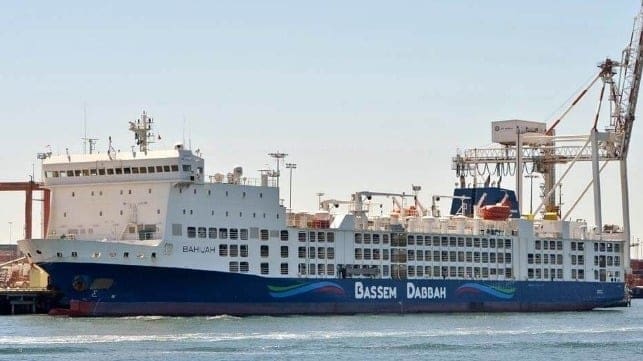
The MV Bahijah in Fremantle in 2018 (Bahnfrend – CC BY-SA 4.0 DEED)
THE role of animal rights group actions in a decision by Australia’s live export regulator to refuse the re-export of an Israel-bound sheep and cattle shipment has been highlighted in a recent government update.
In the Department of Agriculture Fisheries and Forestry update on 8 February, a DAFF delegate said listed the reasons for ordering the MV Bahijah to return to Australia and then refusing a re-export application once the vessel returned to Australia.
The MV Bahijah with about 14,000 sheep and 2000 cattle left Fremantle on 5 January bound for Israel visa the Red Sea, but was recalled around 20 January due to Houthi rebel activity in sea.
The vessel has offloaded about 750 cattle at Fremantle since returning to Australian waters and exporter Bassem Dabbah is now planning to offload the livestock into a feedlot and is expected to rest the sheep and cattle before applying for re-export.
A DAFF update this afternoon said the discharging of livestock on the MV Bahijah will start today and the sheep and cattle will taken by truck from Fremantle Port to appropriate premises in Western Australia.
Several hundred head of cattle were previously discharged from the vessel on 3 February 2024. While the livestock currently aboard the vessel are high-quality Australian animals, they will remain under strict biosecurity control at appropriate premises while the exporter considers its options, DAFF said.
In a recent update, the DAFF delegate said on 19 January the department issued a direction to the exporter to return the consignment to Australia.
“The direction was issued because the department had assessed that there was insufficient information to enable the department to issue approvals for alternative contingency markets, especially given the risks the delegate identified in respect of the nature and timing of the route, the need to access foreign fodder and supplies from a southern European nation, and potential voyage conditions.
“The delegate found that requiring the consignment to return to Australia presented, based on the information available to the department at the time, a comparatively lower risk to the health and welfare of the livestock,” the DFAFF update said.
Subsequently, the exporter’s plans for re-export under a new long-haul management plan were complicated by DAFF concerns about concerns about Israel animal welfare group legal action to prevent the shipment’s importation, risks to Israel import approval and submissions by Animals Australia and RSPCA Australia in relation to the potential risks to animal health and welfare of a potential 65-day voyage.
Israeli animal rights groups Let the Animals Live and Animals Now have filed legal proceedings in the Central Region District Court against the Veterinary Services in the Ministry of Agriculture in Israel. The petition sought an injunction in relation to an import permit for the animals on board the MV Bahijah, that would prevent the sheep and cattle being imported into Israel.
“On balance and weighing everything before me, I considered that the risk that the Israeli competent authority may not be able to grant the import permits or otherwise accept the livestock upon arrival, outweighed the detailed mitigation strategies that had been identified by the approved extended long-haul management plan,” a DAFF delegate submitted in the latest update.
“I found that this updated information, coupled with the uncertainty of the injunction proceedings in Israel, meant that I was unable to be satisfied that import permits were likely to be issued before the livestock were imported into Israel.”
ALEC seeks closing of ‘activist loophole’

Australian Livestock Exporters’ Council CEO Mark Harvey-Sutton
The influence of the animal rights bodies in the DAFF decisions and activist social media activity prompted criticism from the Australian Livestock Exporters Council, which also said the department’s decision’s highlighted the importance of available contingency markets when exporting to the region, “something that every livestock export consignment must have.”
ALEC chief executive officer Mark Harvey-Sutton said DAFF’s finding makes it clear that animal welfare on the vessel was, and continues to be, exemplary – something which was independently verified by DAFF during its decision-making process.
“Time and time again the good animal welfare on the vessel is referenced throughout the decision, highlighting that those saying otherwise were deliberately misrepresenting the truth for nefarious reasons and should be ashamed of themselves,” he said.
“Currently the vessel is sitting offshore in cooler temperatures, well away from the heatwave impacting Perth and Fremantle, while they consider how best to discharge the animals.
“This is despite the disgraceful clickbait currently being circulated on social media by activists claiming that the animals are sweltering off Fremantle,” Mr Harvey-Sutton said.
“This sort of social media activity is nothing more than a marketing campaign to generate donations.
“Make no mistake, these organisations have not missed the opportunity to cynically capitalise on the Bahija issue as a promotional exercise for themselves,” he said.
“This is how these organisations work and how they generate their funding.
“While this is frustrating, the most galling part is the fact, that while duplicitously calling for a swift resolution to the “impasse” while DAFF took 17 days to make its decision, both Animals Australia and RSPCA made multiple third-party submissions to the decision maker, effectively prolonging the time the decision took,” Mr Harvey-Sutton said.
“These submissions were largely ignored by the decision maker, but their obligation to consider them simply chewed up further time, with no regard for the health of the sheep and cattle on the vessel.
ALEC said ultimately, the decision-maker was not confident the vessel would be received by Israel which was the determining factor in not granting the application.
“Legal proceedings instigated by an animal activist group in Israel which has links to Animals Australia, was the key contributor in this uncertainty effectively tying the hands of the decision maker.”
ALEC said it nor the broader Australian industry made third-party representation to DAFF, “nor sought a preferred outcome out of respect for the independence of the regulator.”
However, ALEC said it will be seeking a review of the MV Bahijah decision process “and given the clearly detrimental effect submissions from Animal Australia had on the decision maker’s ability to make a timely decision, will be asking this loophole is closed immediately.”

Just read the DAFF delegate’s reasons.
It demonstrates incompetence in supporting practical solutions, a lack of real animal welfare concerns, being unduly influenced by Animals Australia and its Israeli counterpart and underlying anti-livestock export undertone. Pure politics at play.